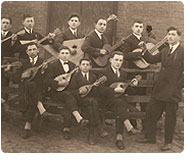|
|
 |
 Fervent Blues, Haunting Songs:
Fervent Blues, Haunting Songs:
The 26th Annual Jewish Music Festival Transforms Traditions from Yemen to Cuba as Premier Platform for New Jewish Music, March 5 – 13, 2011
It started with a knock on Festival Director Eleanor Shapiro’s door. There stood Avner Yonai, an Israeli businessman who had searched record bins and archives from Buenos Aires, Warsaw, and Jerusalem in search of the repertoire his grandfather had played in a Polish Jewish mandolin orchestra before World War II.
“Avner came to me out of the blue,” explains Shapiro. “He was a long-time fan of the Festival and wanted his project to be part of it. The Ger Mandolin Ensemble, 2011 (March 6; Freight and Salvage Coffee House) unites almost a dozen of the country’s strongest mandolin players, directed by Mike Marshall, whose masterful playing has left its imprint on bluegrass, classical, and jazz, with Avi Avital, whose classical performances The New York Times called “exquisitely sensitive.” Avital is a 2011 Grammy-nominee in the soloist with an orchestra category, the first time a mandolin player has received such an honor. Other players include Eric Stein (Beyond the Pale), Jeff Warschauer (Strauss/Warschauer Duo), Radiim Zenkl and Chris Acquavella.
“The Opening Night group Yemen Blues also wanted their Bay Area premiere to be with us, on their first U.S. tour,” Shapiro continues. “It speaks to our role as a leading platform for Jewish arts, and our emphasis on paying creative homage to tradition.”
Known for its embrace of edgy and worldly takes on Jewish roots, the Festival has become the go-to venue for global music inspired by the deep past: artists from the charismatic groove of Yemen Blues and the klezmer cubano of Odessa/Havana, artists breathing new life into the lost repertoires of Romanian villages, Russian Jewish composers, and Polish folk orchestras.
Led by vocalist Ravid Kahalani’s striking voice (formerly of the Idan Raichel Project), Yemen Blues (March 5; Freight and Salvage) stole the show at this year’s international World Music Expo (WOMEX). Taking the Yemenite chants he learned growing up and powered by brassy Afrobeat-tinged funk, blues, jazz and wild oud (Middle Eastern lute), Kahalani and his nine-piece band have a genre-bending drive that swings from the sublime to the ecstatic.
Veretski Pass (March 6; Freight and Salvage), named for the Carpathian native region of violinist Cookie Segelstein’s parents, honors the past by creatively reframing its music. Drawing on the rich melodies and rhythms that flourished where the Balkans and the Ottoman Empire met, Veretski Pass’ virtuosic players craft elegant arrangements and innovative original works, such as “Klezmer Shul.” This recent piece reimagines secular instrumental traditions for a religious context, creating stirring liturgical music with klezmer roots.
A Laureate of the prestigious Queen Elisabeth Competition in Brussels, emerging international star violinist Noah Bendix-Balgley will (March 8 and 10; Crowden School / JCC East Bay) highlight music of the St. Petersburg Society for Jewish Music, a group inspired by Russian composer Nikolai Rimsky-Korsakov that drew on Jewish folk songs to create gorgeous early 20th-century art music. Raised on klezmer and conservatory trained in Europe, Bendix-Balgley is the perfect interpreter for these forgotten gems.
Sometimes playing with the past can get truly rambunctious, as David Buchbinder’s Odessa/Havana (March 12; Berkeley Repertory Theater) demonstrates. Taking a cue from the Jewish masters of the 1950s mambo craze, two major figures in their respective Canadian scenes—klezmer trumpter David Buchbinder (The Flying Bulgars) and Afro-Cuban percussionist Hilario Durán—have cooked up a project as fun-loving and musically distinct as the two ports of call invoked by the group’s name.
The Festival, while attracting world-class artists, never neglects its own roots, the West Coast wing of the klezmer revival born in Berkeley. This year’s events are concentrated in Berkeley's new arts district, with easy access to BART. And in keeping with tradition, the Festival offers a free performance by Bendix-Balgley (March 9; San Francisco Public Library), as well as a Festival-related free Shabbat celebration with members of Yemen Blues (March 4; Temple Beth Sholom, San Leandro).
The all-ages Finale Dance Party (March 13; JCC East Bay) will include Bendix-Balgley, Veretski Pass, Jeff Warschauer, and David Buchbinder, as well as dance lessons by Erik Bendix, who has spent decades researching the line, circle, and partner dances of Jewish communities, giving festival goers a chance to kick up their heels.
“Our vision is to bring new music to our audience, music by artists who have a profound respect for tradition but also have a strong contemporary sensibility,” explains Shapiro. “Yemen Blues does this via West African music and funk, while the composers of the Jewish Folk Music Society did the same thing using European art music before the Russian Revolution. They show how the past can make the future swing.”
Tickets: http://jewishmusicfestival.inticketing.com/events/ or 866.558.4253
Festival information: 510-848-0237
|
|
 |
|
|
|